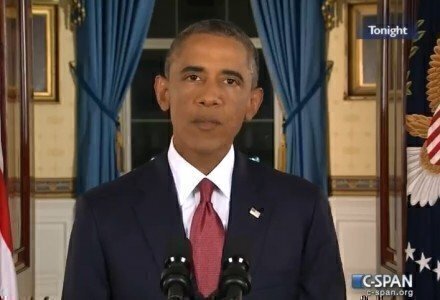President Obama’s critical remarks this week about the Supreme Court and the Affordable Care Act echo similar remarks from three years ago when the Justices were deciding the first big Obamacare challenge.
 On Tuesday, President Obama made his latest case about the ACA to an audience at the Catholic Health Association in Washington, D.C. But it was also clear his words were intended for politicians, and the nine Justices of the Supreme Court.
On Tuesday, President Obama made his latest case about the ACA to an audience at the Catholic Health Association in Washington, D.C. But it was also clear his words were intended for politicians, and the nine Justices of the Supreme Court.
“Five years in, what we are talking about is no longer just a law. It’s no longer just a theory. It isn’t even just about the Affordable Care Act or Obamacare,” President Obama said on Tuesday. “This is now part of the fabric of how we care for one another. This is health care in America.”
“It seems so cynical to want to take coverage away from millions of people, to take care away from the people who need it the most, to punish millions with higher costs of care and unravel what’s now been woven into the fabric of America,” he added in a message that targeted at Obamacare’s opponents.
A day earlier in Europe, President Obama had more pointed remarks for the Supreme Court and its acceptance of the King v. Burwell case, which challenges the legality of Obamacare health-care subsidies in 34 states.
“This should be an easy case. Frankly, it probably shouldn’t even have been taken up,” President Obama said in Germany. “Since we’re going to get a ruling pretty quick, I think it’s important to assume that the Supreme Court’s going to do what legal scholars would expect them to do.”
The Washington Post’s Dana Milbank noted that the remarks were intended for the Justices, among others, but they wouldn’t likely affect the court’s decision.
“The conservative justices, like conservative critics of the law generally, are unlikely to be persuaded by Obama’s recitation of the merits of the law, which he repeated at length Tuesday,” Milbank said.
Back in April 2012, President Obama made similar remarks when the Supreme Court was considering arguments in the first Obamacare challenge.
"Ultimately, I am confident that the Supreme Court will not take what would be an unprecedented, extraordinary step of overturning a law that was passed by a strong majority of a democratically elected Congress," Obama said at a press event in the middle of a presidential campaign.
"And I'd just remind conservative commentators that, for years, what we have heard is, the biggest problem on the bench was judicial activism, or a lack of judicial restraint, that an unelected group of people would somehow overturn a duly constituted and passed law," Obama said. "Well, this is a good example, and I'm pretty confident that this court will recognize that and not take that step."
At the time, when Obamacare’s fate was very uncertain, the President’s legal critics felt the comments were off base.
Randy Barnett, the Georgetown University professor who pursued the first case, told The Daily Telegraph in 2012 the remarks were a "gross mischaracterization of the relationship of the courts to Congress. … There really wasn't anything in that statement that was accurate.”
And Laurence Tribe, Obama’s law professor at Harvard , was equally critical in 2012. “Presidents should generally refrain from commenting on pending cases during the process of judicial deliberation. Even if such comments won’t affect the justices a bit, they can contribute to an atmosphere of public cynicism that I know this president laments.”
The biggest conflict in public between President Obama and the Court was at the 2010 State of the Union address, when the President publicly bashed the Court’s conservatives in the live audience in Congress.
"With all due deference to separation of powers, last week the Supreme Court reversed a century of law that, I believe, will open the floodgates for special interests, including foreign corporations, to spend without limit in our elections," Obama remarked.
Justice Samuel Alito mouthed the words, “not true,” in response as he sat in the audience.
And while President Obama’s remarks about the court are noteworthy, as well as the criticism of them, other Presidents have publicly questioned court decisions.
Franklin Roosevelt, in particular, engaged in Supreme Court name calling in the early parts of his four-term presidency. At one point, Roosevelt told reporters the Court’s decision were remnants of the "horse and buggy definition of interstate commerce.”
Roosevelt’s fifth cousin, Theodore, also lambasted the Supreme Court in his 1908 State of the Union address. “Judges of this stamp do lasting harm by their decisions because they convince poor men in need of protection that the courts of the land are profoundly ignorant of and out of sympathy with their needs,” he said.
Andrew Jackson and Abraham Lincoln were also sharply critical of the Supreme Court at times, and Thomas Jefferson’s battles with the early Court left a vivid impression on the third President.
“This member of the Government was at first considered as the most harmless and helpless of all its organs. But it has proved that the power of declaring what the law is, ad libitum, by sapping and mining slyly and without alarm the foundations of the Constitution, can do what open force would not dare to attempt," he remarked in 1825.







